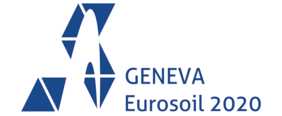The objective of Eurosoil 2020 is to bring together leading research scientists working on soil related topics and stakeholders dealing with issues of public concern, such as soil degradation and consequences of climatic changes.
At the conference, FiBL will co-organise three sessions under the theme SDG2 – Zero Hunger and one session under the theme SDG13 – Climate Action:
- Session 2.03: How to close nutrient cycles for future Zero Hunger (Else Bünemann)
- Session 2.06: Soil ecological engineering and management of soil biology. A contribution to achieving zero hunger? (Sarah Symanczik)
- Session 2.10: The potential of organic agriculture and other agro-ecological approaches to conserve and improve soil quality (Paul Mäder)
- Session 6.20: Carbon credits for soil carbon sequestration to mitigate climate change and enhance soil fertility (Markus Steffens, Adrian Müller)
Don’t forget to submit your abstract by 28 February Dr. Paul Mäder, FiBL Switzerland
Links
- eurosoil2020.com: Conference website
- b-com.mci-group.com: Call for contributions – Abstract submission (Deadline: 28 February 2020)
Further information about FiBL sessions:
Session 2.03: How to close nutrient cycles for future Zero Hunger
Nutrient inputs into agricultural systems are essential for sustainable production. Most mineral fertilizers, however, are based either on finite mineable resources, require high energy demanding production and/or have environmental side effects. Recycling of nutrients from various waste streams is thus increasingly important and part of the circular economy which is a high priority to the EU. Recycling of nutrients can occur at different scales and may ultimately contribute to reducing global imbalances of nutrient use in agriculture as well as eutrophication and contamination of natural ecosystems. Many approaches for closing nutrient cycles are under development, but often have trade-offs with respect to effects on soil quality. For example, a focus on the recovery of one nutrient may prevent simultaneous closure of other nutrient cycles. Likewise, the destruction of organic matter during the recycling process facilitates risk assessment with respect to organic pollutants but contributes to the depletion of soil organic matter. The objective of this session is to compare different approaches towards closing nutrient cycles, with a special focus on the effects of recycled fertilizers on soil quality.
Session 2.06: Soil ecological engineering and management of soil biology. A contribution to achieving zero hunger?
"Industrial intensification of agricultural production has been a strategy to keep up with the demand for increased food production in the last century but has had profound and lasting effects on (agro)ecosystems. Consequently, more sustainable forms of agricultural intensification have to be developed, where ecological processes are managed with the aim of reducing anthropogenic inputs such as fertilizers or pesticides while increasing sustainability and resilience. Soil organisms drive multiple ecosystem processes that can improve soil fertility and sustain plant growth. In addition to fostering indigenous microbes, a rise of commercial products (i.e. biostimulants) aiming to increase soil nutrient availability has occurred in recent years. Novel methods allow new insights into the presence of organisms in the soil and their contribution to soil functions. For this session we invite scientists and stakeholders working on i) biological processes that improve soil quality for sustainable crop production; ii) biostimulants that aim to promote soil biological processes such as nutrient mobilization or beneficial soil life (e.g. mycorrhizae) and iii) farming practices that foster living soils."
Session 2.10 The potential of organic agriculture and other agro-ecological approaches to conserve and improve soil quality
"The aim of the session is to elucidate, how organic agriculture and other agroecological approaches such as conservation agriculture contribute to soil quality while guaranteeing food security and economic resilience. New concepts of soil quality will be reviewed, stressing on the multi-functionality of soils such as food and fibre and fuel production, climate and water regulation, biodiversity maintenance, erosion control and pest and disease control. Key challenges of soil quality in organic agriculture and related management practices will be addressed in smaller groups: a) net carbon balance with respect to system boundaries, carbon imports and carbon mining outside the system, b) identification of key drivers to increase soil organic carbon (eg mixed farming, reduced tillage, residue management and crop rotation), and c) institutional arrangements to support conserving and improving soil quality (e.g. the 4per1000 initiative). In a final plenary, a synthesis of the working groups will be presented and discussed with invited representatives of various farming systems (organic agriculture, conservation agriculture, agroecology). The session should be of interest for soil scientists, agronomists, economists and sociologists, as well as farmers and NGOs oriented to sustainable agriculture and nature protection."
Session 6.20 Carbon credits for soil carbon sequestration to mitigate climate change and enhance soil fertility
"We will shortly introduce how the policy instrument “Carbon credits” work, where it comes from and why it is increasingly promoted in agriculture and for soil carbon sequestration in particular. We will then focus on the key challenges of carbon credits for soil carbon sequestration, which are Measurement/Reporting/Verification; Additionality; Permanence; and Leakage. We will then in small groups address each of these issues in more depth, guided by one of the session conveners and additional experts as needed to assure small groups of 5 to 7 people. A synthesis, final plenary discussions and concluding remarks close this session."




